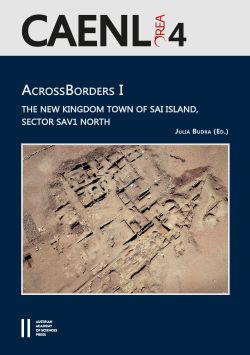Julia Budka
is Professor of Egyptian Archaeology and Art History at the Ludwig Maximilian University Munich
|
 |
The present volume is the first in a series of monographs dedicated to the results achieved by AcrossBorders, a European Research Council Project (Austrian Academy of Sciences and Ludwig Maximilian University Munich). With its so-called Egyptian temple town and adjacent pyramid cemeteries, Sai Island is one of the prime examples for settlement policy of New Kingdom Egypt (c. 1530-1070 BC) in Upper Nubia (northern Sudan) and is the focus of this project. New fieldwork and multi-layered research conducted by the AcrossBorders project has provided fresh insights on living conditions in New Kingdom Nubia in direct comparison with Egypt.
This volume is dedicated to SAV1 North, the sector situated along the northern enclosure wall. It was excavated between 2008 and 2012 by the Sai Island Archaeological Mission and processed within the framework of AcrossBorders. The principal focus of the book is the physical remains of SAV1 North: the architecture and material culture, with emphasis on the pottery and small finds.
Datable to the mid to late 18th Dynasty, the building phase labelled as Level 3 was the heyday of sector SAV1 North – a time well-attested by several architectural remains with associated finds and pottery, which are all presented in the volume. A summary of thoughts on possible hints about the lifestyle and activities at SAV1 North preserved in the material remains completes AcrossBorders I. All in all, the evidence from SAV1 North underlines the important role Sai plays in understanding settlement patterns in New Kingdom Nubia.
… |




 Home
Home
 Print
Print
 References
References
 Share
Share
